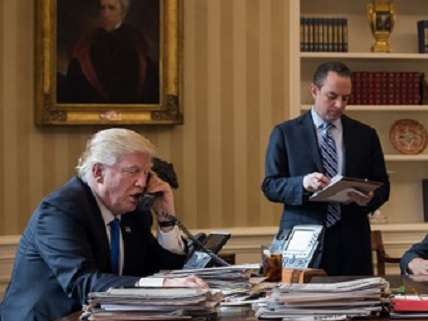President Trump Stresses U.S. Support for One China Policy
Meanwhile, China's positioning itself as a champion of free trade and globalization in the Trump era.

President Donald Trump and China President Xi Jinping talked on the phone for the first time since Trump took office last month—Trump had spoken to about twenty world leaders before that as president, but had only communicated with Xi via letter after a brief November call. Chinese officials, too, were reticent about a phone call, particularly after discouraging reports of calls such as the one between Trump and Australia's prime minister.
Nevertheless, the Trump-Xi phone call went as well as the Chinese government could have expected. There were no reports of the call going off-script, and Trump re-iterated his support for the "One China" policy, which was far from clear before the call. The "One China" policy, which states that the U.S. recognizes that Chinese living on either side of the Taipei believe they are one China, and that Taiwan is a part of it. The policy was first articulated in 1972 when Richard Nixon became the first U.S. president to visit Communist China.
In December, Trump took a high profile call from the president of Taiwan that had reportedly been weeks in the making. That call broke a decades-long precedent of U.S. presidents and presidents-elect not contacting the head of government of Taiwan as part of the "One China" policy, which Trump questioned in the fall out over the phone call.
Nevertheless, despite a loud outcry, particularly from the U.S. foreign policy establishment but also from China, the move appears ultimately to be of little consequence. The Chinese seized a U.S. underwater drone in the South China Sea. Trump, who was still president-elect, tweeted that they should keep it, after the Chinese government had already returned it. The Chinese government filed a diplomatic protest over Trump's comments but officials have avoided publicly calling for a more aggressive posture in retaliation.
Far more influential on China's overall posture appears to have been the decision by Trump to, as promised during the campaign, withdraw the U.S. from the Trans-Pacific Partnership (TPP), a trade deal between 12 Pacific countries that excluded China, part of President Obama's broader "Asia pivot," an effort to contain China. President Trump withdrew the U.S. from the TPP process. Some countries want to continue but Japan's prime minister called a deal without the U.S. "meaningless."
In a speech at the World Economic Forum in Davos shortly before Trump's inauguration, China President Xi Jinping warned that globalization was not the cause of the problems the world faced. "We must remain committed to free trade and investment. We must promote trade and investment liberalization," he told the audience. "No one will emerge as a winner in a trade war." Shortly after Trump's inauguration, China's premiere, Li Keqiang, argued in a column in Bloomberg in favor of "economic openness" and offered China as an "anchor of stability and growth with its consistent message of support for reform, openness, and free trade."
For all its foreign policy faults, the U.S. has generally been an outspoken champion of free trade in the post-WW2 era, from which the U.S. and the rest of the world have benefited tremendously. That countries like China could step up in defense of free trade, no matter how purely rhetorical or self-serving that defense is, is still a testament to just how successful it has been in lifting the world out of poverty.


Show Comments (35)